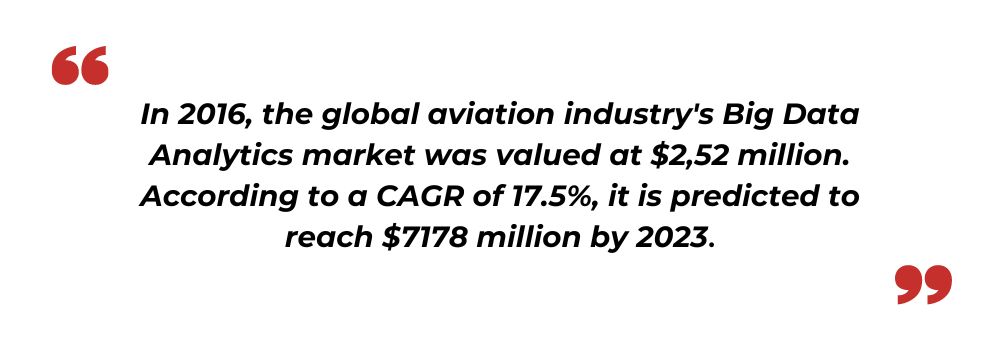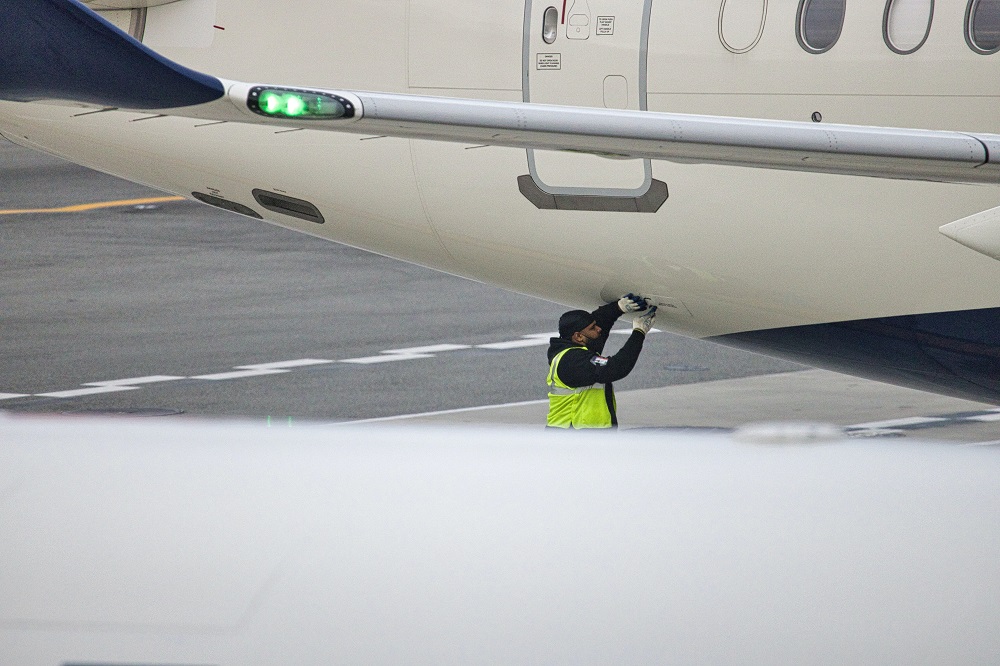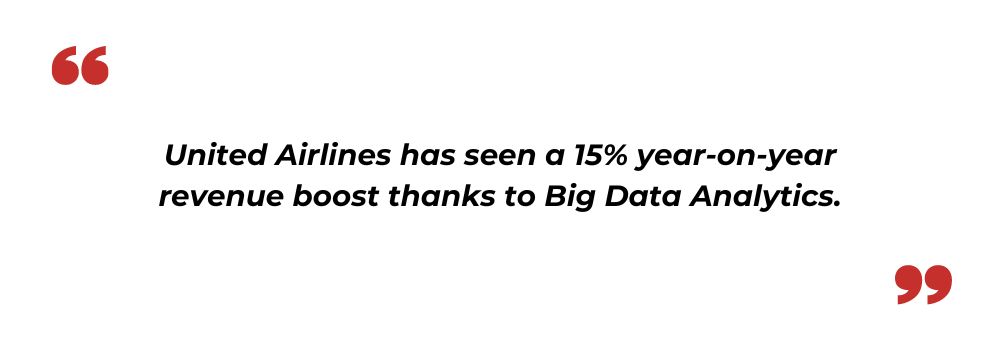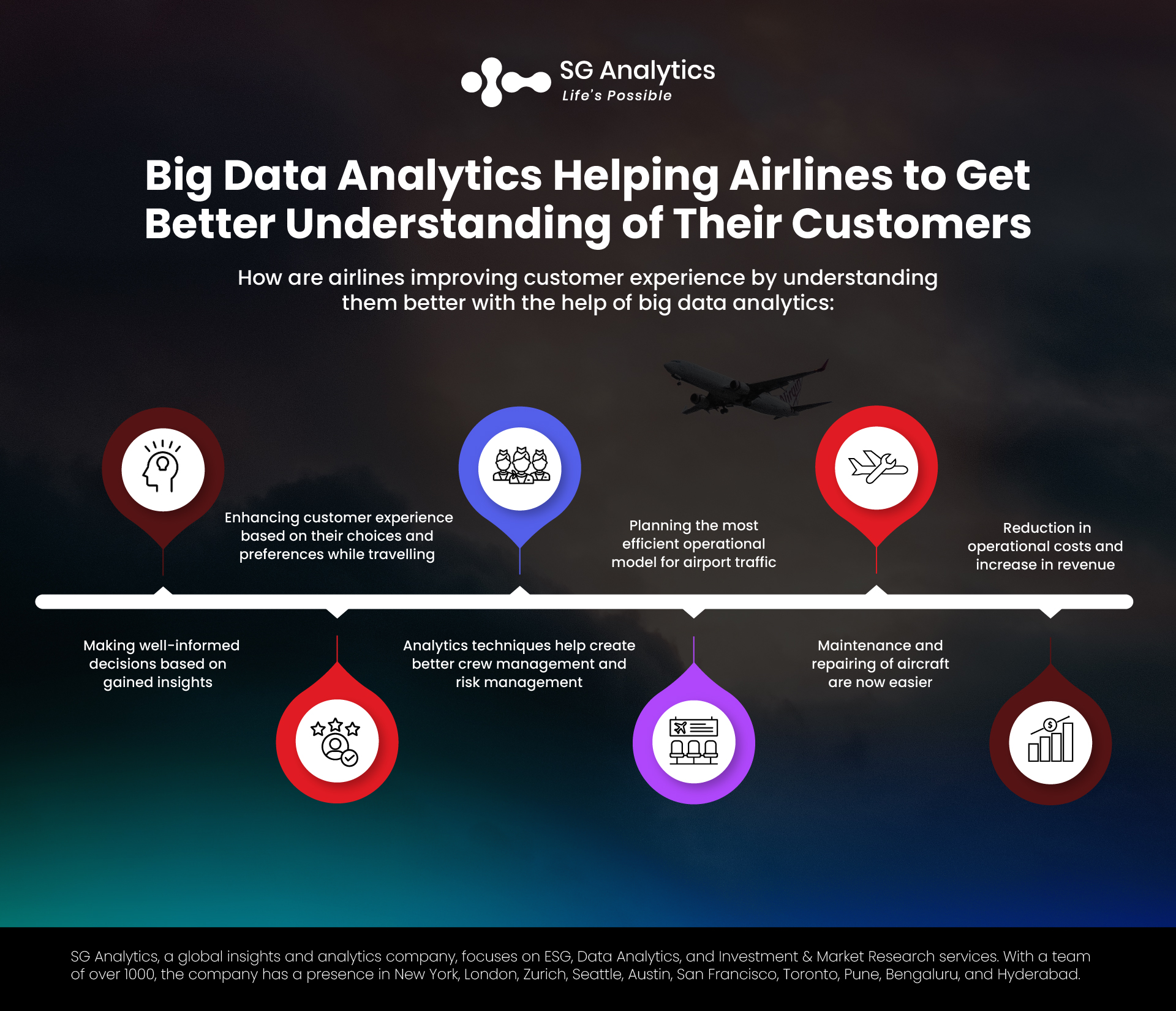Big Data is transforming every industry. How can airlines profit from data collecting and analysis as one of the largest industries with access to a wide range of data?
When it comes to technology, hospitality and aviation have pushed things to a whole new level. Aviation has been one of the first industries to incorporate data analytics into its core in recent years, thanks to advances in Big Data Analytics. Big Data and Artificial Intelligence, two cutting-edge technologies, have transformed the way major telecommunications companies serve their customers. The airline industry has traditionally been a leader in customer service.
The industry is increasing rapidly as a result of the many changes taking place at its heart. A growing number of qualified people are needed to access this vast reservoir of knowledge. All of the aviation industry's growth has been boosted by this integration, from more customer access to enhanced customer satisfaction.

In 2016, the global aviation industry's Big Data Analytics market was valued at $2,52 million. According to a CAGR of 17.5 percent, it is predicted to reach $7178 million by 2023 (TechVidvan).
Ways Data Analytics is Revolutionizing the Sector
In general, why do we need technology (not only Big Data)?
However, no matter where you begin, it is always the purpose of technology to improve human life by reducing physical effort and improving productivity. When it comes to a work process, technology should be able to offer value and remove barriers. In the aviation industry, using data analytics modules has the following advantages:
1. Make well-informed decisions based on insights gained.
These features assist consumers in making well-informed decisions and setting their expectations accordingly. One such feature is the measurement of performance. There are several ways airlines can better understand where and why they're doing well or poorly by analyzing the largest number of passengers by categories such as city, kind of flight or route name. To maximize yield, airlines use these insights and connect them to booking, price sensitivity and customer behavior data to make informed decisions and design strategies that foster customer loyalty and boost brand acceptance

2. Enhance the overall experience for customers
The customer experience is a fundamental part of airline analytics. It is possible for airlines to improve their service delivery by analyzing consumers' booking histories, flight choices, and other data. However, the ease that these statistics provide to customers is their main selling point. Managers are able to spot trends in raw data, such as where there are problems and possibilities to save money and increase profits.
For example, the airline sector uses predictive analytics to keep consumers up-to-date and promote special offers based on their individual needs, habits and unique travel experiences. The quickness with which a company responds to a customer's inquiry is just as important as the procedures taken to resolve the issue itself.
Contingency planning
Unfortunately, huge disasters have befallen the airline sector around the world in the last several years. Since these types of occurrences can have an enormous detrimental impact on the aviation industry, it is imperative that airlines establish various risk management models and techniques in order to safeguard themselves. Analytical techniques such as these can be extremely useful in these situations.
There are several crew management methods that can help alleviate the risk of weariness that pilots face as a result of frequent time zone shifts and extended duty days, among other factors.

Aids in the Better Management of Airport Traffic
Airport congestion is on the rise as new aircraft routes, and flight operators are added on a daily basis. Airport officials throughout the world face an operational headache when trying to keep track of so many distinct flights while also dealing with a limited number of airports and bendable runaways. This is the first big use of Big Data. Airport capacity, runway bandwidth, number of passengers, and route options are all used by data specialists to detect trends in data and suggest the most efficient operational models.
Going digital in enhancing passenger conveniences.
Integrating data collecting and processing modules helps flight operators understand client needs. Big data and analytics help the aviation industry better serve passengers. Real-time dashboards and predictive maintenance are boosting aviation.
Airports can use walking speed data to reduce long security queues. When airports and operators understand their customers' demands, they can better serve them and gain a competitive edge.

Maintaining an Aircraft is Made Easier with Predictive Analytics and Big Data
Airplane maintenance is a labor-intensive process in aviation. Other personnel must be on the hangar floor to review compliance papers, record maintenance, and compliance data, manually inspect the aircraft, operate safety equipment, and more. Big data analytics can help airlines optimize airspace use, notably runway bandwidth, flight routes, aircraft types, etc., as airport traffic grows daily.
When planes are delayed or canceled, airlines must pay substantial sums in maintenance and compensation to stranded passengers. Unexpected maintenance accounts for 30% (TechVidvan) of the total delay. Alerts, notifications, and reports let technicians monitor an aircraft's mechanical state to avert a failure. Data analytics and simulations can save flight operators time and money.
Airline revenue has risen.
Data analytics helps the sector understand consumer preferences and maintenance problems. Ticket booking uses predictive research to target customers with personalized offers and optimizes prices in real-time. Airlines can gain more reservations by collecting important data.
The price customers are willing to pay for a product depends on their target demographic and the time of purchase. Revenue management professionals use AI to evaluate destinations and prices for specific markets, find effective distribution methods, and manage seats.

Reduction in costs
Analytics will minimize airline luggage loss expenses. Real-time baggage tracking can help airlines avoid misplacing, trashing, or otherwise damaging passengers' bags. Data-driven systems determine the optimal fuel for a trip. By prioritizing data collection and analysis, airlines of all sizes may profit from big data.
-
Data modules that are properly applied can help airlines gain more customers and profits.
-
Predictive analytics is essential for developing a crisis mitigation strategy and planning for any future disasters.
-
It enables firms to make better policy decisions based on data.
-
The use of data analytics in flight operations and maintenance is not limited to sales and customer service.
Also Read - How Is Real-Time Data Analytics Helping in Increasing Business Revenue?

Conclusion
United Airlines has seen a 15% (TechVidvan) year-on-year revenue boost thanks to Big Data Analytics. Big Data and AI have a major impact on the way planes, and airports handle an ever-increasing number of passengers. Companies can get a significant advantage in the marketplace by utilizing Big Data insights. These innovations enhance the overall flight experience and help the industry grow.
Airline companies may use Big Data to learn more about their customers, spot patterns in their activity, discover preferences and anticipate future needs. In today's highly competitive airline industry, Big Data insights can help airlines make strategic decisions and differentiate themselves.
With a presence in London, New York, San Francisco, Austin, Seattle, Toronto, Zurich, Pune, Bengaluru, and Hyderabad, SG Analytics, a pioneer in Research and Analytics, offers tailor-made services to enterprises worldwide.
A leader in Data Analytics Services, SG Analytics focuses on leveraging data management & analytics and data science services to help businesses discover new insights and build strategies for business growth. Contact us today if you are looking to make critical data-driven decisions to prompt accelerated growth and breakthrough performance.









